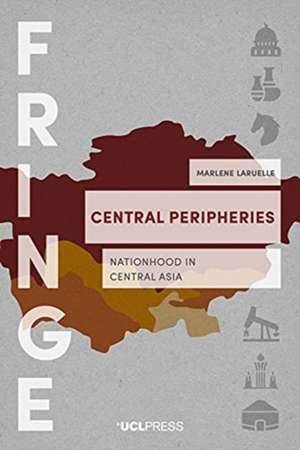Central Peripheries: Nationhood in Central Asia: FRINGE
Autor Marlene Laruelleen Limba Engleză Paperback – 4 ian 2022
Committed to internationalism, Kazakhstan and other central Asian states nevertheless embrace classically nationalist conceptions of the nation-state. Their unabashed celebration of borders and citizenship challenges Western views of nationalism as a dying ideology transcended by cosmopolitanism. Drawing on twenty years of fieldwork, Central Peripheries reveals the origin of central Asian national consciousness in imaginary and ritualized efforts to grapple with the Soviet past.
Preț: 179.33 lei
Nou
Puncte Express: 269
Preț estimativ în valută:
34.34€ • 35.22$ • 28.91£
34.34€ • 35.22$ • 28.91£
Carte disponibilă
Livrare economică 05-19 februarie
Livrare express 22-28 ianuarie pentru 25.94 lei
Preluare comenzi: 021 569.72.76
Specificații
ISBN-13: 9781800080140
ISBN-10: 180008014X
Pagini: 262
Ilustrații: halftones
Dimensiuni: 156 x 234 x 18 mm
Greutate: 0.36 kg
Editura: UCL Press
Colecția UCL Press
Seria FRINGE
ISBN-10: 180008014X
Pagini: 262
Ilustrații: halftones
Dimensiuni: 156 x 234 x 18 mm
Greutate: 0.36 kg
Editura: UCL Press
Colecția UCL Press
Seria FRINGE
Notă biografică
Marlene Laruelle is professor of European, Russian, and Eurasian studies at George Washington University.
Cuprins
List of figures
Preface
Introduction: Central peripheries
Part 1. Writing the national biography
1. The longue durée of national storytelling: Soviet roots and the quest for ethnogenesis
2. Centrality and autochthonism: Uzbekistan’s nationhood
3. Aryan mythology and ethnicism: Tajikistan’s nationhood
4. National unity versus pluralism: Kyrgyzstan’s nationhood
5. Reborn nation, born-again religion? The case of Tengrism
Part 2. Politics and the Nazarbayev order
6. Hybridity in nation-building: the case of Kazakhstan
7. Ideology of the ‘crossroads’: Eurasianism from Suleimenov to Nazarbayev
8. Media and the nation: searching for Kazakhness in televisual production
9. Language and ethnicity: the landscape of Kazakh nationalism
10. Generational changes: the Nazarbayev Generation
Conclusion: The missing pieces of Central Asia’s nationhood puzzle
References
Index
Preface
Introduction: Central peripheries
Part 1. Writing the national biography
1. The longue durée of national storytelling: Soviet roots and the quest for ethnogenesis
2. Centrality and autochthonism: Uzbekistan’s nationhood
3. Aryan mythology and ethnicism: Tajikistan’s nationhood
4. National unity versus pluralism: Kyrgyzstan’s nationhood
5. Reborn nation, born-again religion? The case of Tengrism
Part 2. Politics and the Nazarbayev order
6. Hybridity in nation-building: the case of Kazakhstan
7. Ideology of the ‘crossroads’: Eurasianism from Suleimenov to Nazarbayev
8. Media and the nation: searching for Kazakhness in televisual production
9. Language and ethnicity: the landscape of Kazakh nationalism
10. Generational changes: the Nazarbayev Generation
Conclusion: The missing pieces of Central Asia’s nationhood puzzle
References
Index
Recenzii
“Marlene Laruelle paves the way to the more focused and necessary outlook on Central Asia, a region that is not a periphery but a central space for emerging conceptual debates and complexities. Above all, the book is a product of Laruelle's trademark excellence in balancing empirical depth with vigorous theoretical advancements.”
“There is no other book that delves so deeply into the complex issue of Central Asia nation-building. Laruelle offers comprehensive empirical evidence to highlight similarities and differences in the processes whereby the leaderships of four Central Asian states attempted to build their nationhood after the Soviet collapse.”
“Using the concept of hybridity, Laruelle explores the multitude of historical, political and geopolitical factors that predetermine different ways of looking at nations and various configurations of nation-building in post-Soviet Central Asia. Those manifold contexts present a general picture of the transformation that the former southern periphery of the USSR has been going through in the past decades.”












